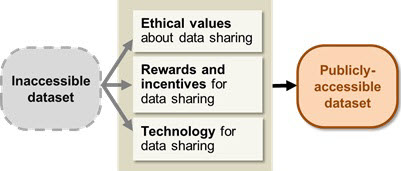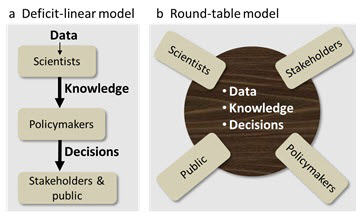We are pleased to bring you a guest feature from Professors from Michigan State University who have recently published an article on data sharing in BioScience.
Sharing: More than Simply Playing Nice
By Georgina M. Montgomery, Kevin Elliott, Patricia Soranno, and Kendra Cheruvelil
(Michigan State University, U.S.A.)
It will not be a surprise to readers of the National Biodiversity Network (NBN) Newsletter that some scientific disciplines have embraced data sharing more than others. Unfortunately, environmental scientists have lagged behind their colleagues in fields like genetics or astronomy. For environmental scientists, the normal practice is to not share data. Much of the conversation about data sharing in environmental science has focused on the many reasons to keep your data to yourself: technological difficulties; issues of competition for publications and grants; and concerns over careers and promotions (see Figure 1). Although many of these concerns have some legitimacy, they are reasons to reform the way we do science, not reasons not to share data.

Figure 1. The major reasons that scientists do not share their data. (Copied from Figure 1 in Soranno et al. 2015)
Running parallel to discussions about data sharing, the field of environmental science, like the broader science community and society in general, has been moving towards greater inclusion. Be it caucuses within scientific societies, broader impact activities associated with research grants, or grassroots activism in science departments and organizations, many of us believe increasing the diversity of people collecting and analyzing data is a good thing for society, and a great thing for science. In fact, studies in psychology, business, and education have shown that more diverse teams come up with more creative solutions to some problems than do less diverse teams.
But, how can we advocate for inclusion in science and not share data? In our article, recently published in BioScience, we argue that this tension creates a significant conflict in the field of environmental science, one that can only be resolved by making sharing data the default practice. We focus on three spheres in which environmental scientists have begun to adopt inclusion as an ethical value. First, environmental teams and national and international networks, such as NBN, are providing increasing opportunities for scientists from smaller institutions and from the Global South to participate in research efforts. Second, citizen-science initiatives allow people outside of the scientific community to influence and participate in environmental research. Third, are science-policy interactions, in which the dominant model for such interactions has shifted away from a “linear” model, in which scientists controlled the flow of information, toward a “round-table” approach in which multiple stakeholders work together to generate and analyze information (Figure 2). In each of these three areas, we point out that serious efforts at inclusion will fail if environmental scientists do not incorporate data sharing into their practice. On this basis, we argue that data sharing is not simply optional or preferred; it is, in fact, ethically obligatory.

Figure 2. A depiction of the way that environmental scientists have interacted with policy makers in the past (a), and the way that they are doing so more commonly today (b). (Copied from Figure 2 in Soranno et al. 2015)
Consider, for example, the rise of environmental research teams and networks. In order to facilitate the success of all scientists within research networks, data sharing is crucial, but policies for making data available still vary significantly across networks. Similarly, citizen science initiatives fail to achieve much of their inclusionary potential if the data generated from the research are not made available to the full range of citizens involved in the research. Data sharing is also essential for promoting the shift toward round-table approaches to science-policy interactions. To be meaningful, this transition requires data sharing so that the stakeholders invited to the table can make informed decisions.
Our BioScience article struck a chord with many organizations like NBN that advocate for the sharing of scientific data. The Atlantic, Science Daily, and various social media outlets also picked up our article and began citing and expanding on it. Although media buzz is certainly gratifying, we are keen to see change “on the ground.” Therefore, we have begun work on a new project to explore how scientists can alleviate the concern that data sharing will leave vulnerable researchers at risk of being “scooped.” Since the BioScience article was submitted, we have expanded our collaboration to include Isis Settles, a psychologist at MSU, and we recently received a grant from the U.S. National Science Foundation to collect data on how the level of diversity within environmental-science teams affects the ethical behaviors of scientists for practices like data sharing and assigning credit. Our study defines diversity broadly, looking at gender, race, socioeconomic background, nationality, professional rank, and discipline, reflecting the growing number of international and interdisciplinary teams currently emerging in environmental science fields. We hope that studies such as this one will help environmental scientists to create and maintain research teams and networks that promote open-science and data sharing, which ultimately influences the science itself and the application of it to solve current and emerging problems.
Further reading
For more on this new project click here
To read the BioScience article click here
To read more about the role of diversity in creating and maintaining effective research teams, click here
